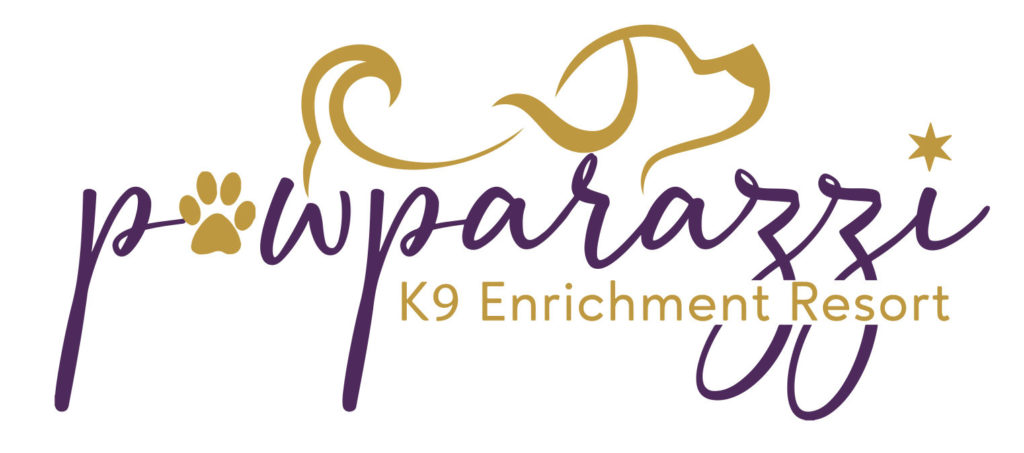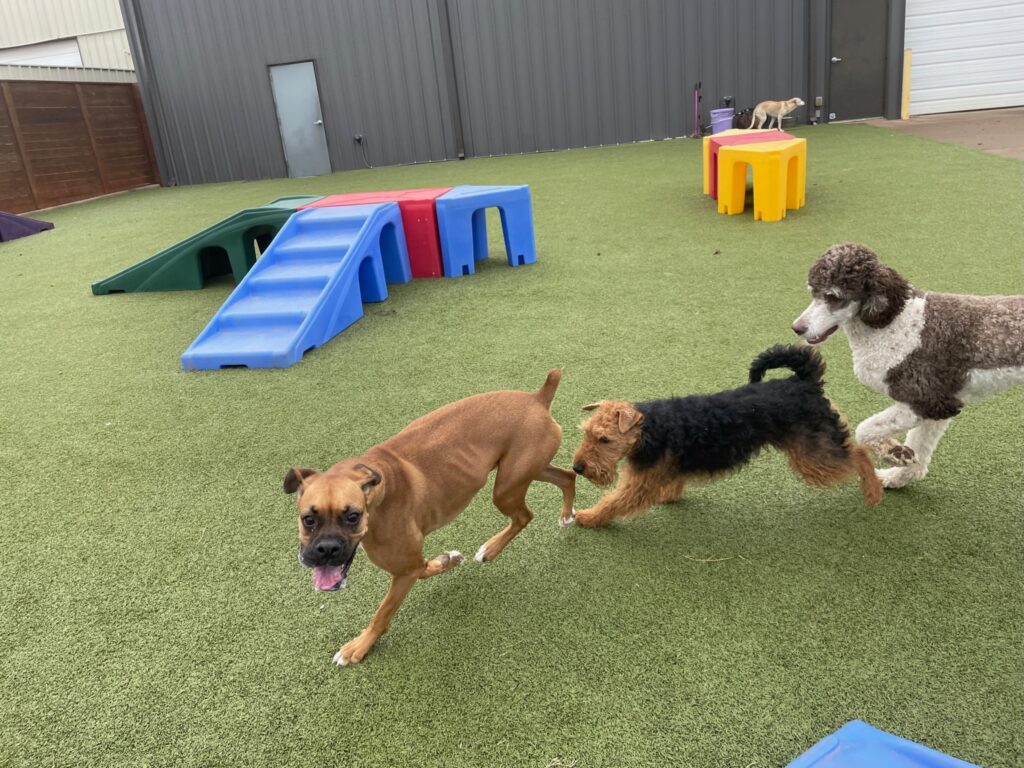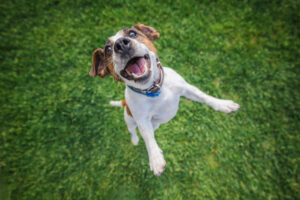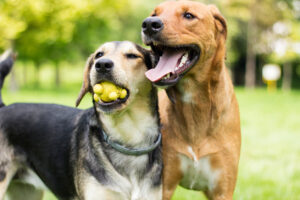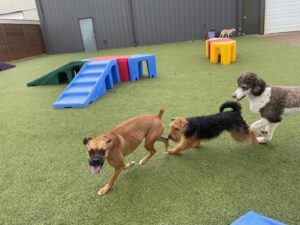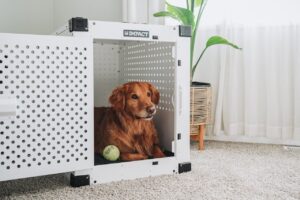Recent studies reveal that over 87% of dog owners recognize a noticeable improvement in their furry friends’ behavior following regular daycare visits. But what drives this transformation? As social animals, dogs thrive in environments that promote interaction, and dog daycare provides just that. The structure and playtime create a harmonious setting where canines learn essential social cues.
Historically, the concept of dog daycare emerged as a solution to urban living, where solitary confinement in homes became the norm for many pets. Today, it’s a blend of necessity and nurturing, offering structured environments for dogs to balance physical activity with mental stimulation. With 68% of pet parents noting reduced anxiety in their dogs, the statistics are clear—daycare isn’t just about play; it’s about developing a well-adjusted, confident companion.
Dog daycare socialization offers numerous benefits, including enhanced communication skills, reduced fear and anxiety, improved physical health, encouraged positive behavior, and a structured environment. These elements contribute to a well-rounded development, ensuring dogs are happier, healthier, more adaptable, and socially confident.

Dog Daycare Socialization Benefits: 5 Reasons It Helps!
Bringing your dog to daycare can be a game-changer for their social skills. At daycare, dogs interact with others, which helps them learn communication. This kind of interaction boosts their confidence and makes them friendlier. Dogs pick up on social cues and become less anxious around both other dogs and humans. Regular play and engagement cultivate a more adaptable and emotionally healthy pet.
Regular play at daycare not only helps with behavior but also improves physical health. Active play sessions increase exercise, aiding weight management and boosting cardiovascular health. Physical activity also positively impacts mental health and can reduce stress levels. A tired dog is usually a happy dog, and daycare provides the needed energy outlet. Energy release via exercise helps prevent destructive behavior at home as well.
Socializing at daycare encourages better behavior both at home and outside. In a structured environment, dogs learn manners and obedience commands. Here, professional caregivers assist in reinforcing discipline in a nurturing setting. Dogs become more familiar with sharing and cooperating during play. These experiences enrich their development and make them better companions.
Dog daycare provides a structured environment that many pets thrive in. Professional staff supervises activities, ensuring safety and equal participation. This setting allows for controlled interactions and peace of mind for pet owners. Pet owners know their dog receives comprehensive care, from nutrition to social interaction. The benefits of this holistic approach reverberate in happier, better-behaved dogs at home.
Reason 1: Enhances Communication Skills
Dogs are naturally social creatures, and daycare gives them a chance to hone their communication skills. Being around other dogs helps them learn the nuances of barking, body language, and even silence. They observe and mimic the behaviors of more socially adept dogs. This environment encourages them to engage more, boosting their confidence. Over time, they can understand and respond better to different social cues.
In a daycare setting, dogs encounter various situations where communication is key. They meet dogs of different temperaments and learn how to interact with each one. This experience helps them differentiate between playful, neutral, and aggressive behaviors. With trained professionals guiding these interactions, dogs also learn when to approach or avoid certain behaviors. Such real-world social situations enhance their adaptability.
Dogs improve their communication not only with other canines but also with humans. When dogs spend time in daycare, they often become more receptive to human commands. Familiarity with different voices and tones teaches them to be attentive and responsive. This helps build trust and a stronger bond with people. As a result, dogs become friendlier and easier to manage.
Enhanced communication skills help dogs coexist peacefully in diverse environments. They can diffuse tense situations or prevent conflicts entirely. These skills are invaluable, especially in urban settings with more pets and people. Whether at the park, home, or traveling, well-socialized dogs tend to be more relaxed and happy. Such benefits make daycare a rewarding experience for both dogs and their owners.
Reason 2: Reduces Fear and Anxiety
Many dogs experience fear and anxiety in unfamiliar situations. Daycare provides an environment where they face different settings and learn to cope. Being around other dogs helps them realize there’s little to fear. As they play and engage, their stress levels naturally decrease. This consistent exposure to new experiences builds their confidence over time.
At daycare, dogs encounter various stimuli, which helps them adapt to change. They get accustomed to different sounds, smells, and sights every day. This exposure makes events like vet visits or loud noises at home less intimidating. By regularly experiencing such stimuli in a safe setting, their overall anxiety can reduce dramatically. The presence of trained staff also ensures they feel supported throughout.
Dogs with regular daycare sessions often show improvements in behavior. Less anxious dogs tend to be more obedient and friendly. This is because fear no longer clouds their decision-making. As a result, they can focus better on commands and interactions. This positive change is noticeable not only in daycare but also at home and in public spaces.
Reduced fear and anxiety can greatly enhance a dog’s quality of life. Calmer dogs are generally more playful and curious. They explore their surroundings with enthusiasm, instead of apprehension. This mindset leads to increased happiness and satisfaction. For pet owners, seeing their dog thrive without fear is truly rewarding.
Reason 3: Promotes Physical Health
Physical health is essential for keeping dogs happy and active. At daycare, dogs have plenty of opportunities to play and exercise. Running, jumping, and playing fetch are some of the daily activities that keep them fit. These exercises contribute to muscle strengthening and improved coordination. Regular physical activity also helps manage their weight and prevent obesity.
The structured routine at daycare ensures dogs receive consistent exercise. A typical day might include supervised playtime, walks, and agility exercises. Each session is designed to suit a variety of breeds and fitness levels. This diversity ensures every dog gets the right amount of exercise tailored to their needs. It keeps them engaged and lessens the risk of health problems associated with inactivity.
Beyond helping with weight, regular exercise benefits a dog’s cardiovascular health. Activities that raise a dog’s heart rate improve blood circulation and lung function. This enhances their overall stamina and can lead to a longer, healthier life. It also reduces the risk of ailments like heart disease and diabetes. Engaging in these activities regularly ensures these health benefits are sustained.
Strengthened bones and joints are other perks of daycare exercises. Physical activities help maintain strong skeletal structures. They also aid in preventing conditions like arthritis as dogs age. Caregivers monitor and adjust activities to make sure dogs don’t overexert themselves. Having such a carefully balanced regimen fosters long-term wellbeing.
Social interaction during exercise adds to its benefits. Playing in groups boosts social confidence while also offering a fun challenge. Dogs enjoy activities more when they see their peers involved. This team environment encourages participation and builds enthusiasm for exercise. Ultimately, they develop lifelong healthy exercise habits.
Reason 4: Encourages Positive Behavior
Engaging in dog daycare can lead to noticeable improvements in a dog’s behavior. Dogs learn to interact in socially acceptable ways by playing with others. Positive interactions are consistently encouraged and reinforced in daycare settings. This structured environment helps curb unwanted behaviors like biting and excessive barking. With the guidance of trained staff, dogs pick up good habits fast.
Daycare provides a routine that promotes discipline and stability. Regular schedules of play and rest help dogs understand boundaries and expectations. Consistency in this routine translates to better behavior at home. When dogs know what to expect, they are less likely to act out. Predictable schedules reduce anxiety, making them more relaxed and well-behaved.
Socializing with a variety of dogs teaches patience and adaptability. Dogs learn to be more flexible and less reactive, even in unfamiliar situations. Exposure to different breeds, sizes, and personalities helps them become more tolerant. This adaptability is key to preventing aggressive behavior. By regularly adjusting to new playmates, they become more balanced and well-mannered.
Positive reinforcement techniques are a core part of most daycare programs. Rewards for good behavior encourage dogs to repeat those actions. This can include treats, praise, or extra playtime. Over time, positive behaviors become ingrained, reducing the need for disciplinary actions. This reinforcement of good behavior makes dogs more cooperative and obedient.
Dogs often model the positive behaviors they see in others. Being around well-behaved dogs at daycare can inspire them to follow suit. This peer influence helps shape their overall demeanor. Observing calm and composed behavior teaches them to replicate it. Thus, peer learning becomes a valuable tool in behavior improvement.
Lastly, the mental stimulation provided at daycare keeps dogs engaged and focused. Boredom can lead to destructive behavior, but a stimulating environment prevents this. Various activities and games keep their minds occupied in a positive way. Engaged and mentally satisfied dogs are less likely to develop bad habits. Overall, dog daycare supports a happier, well-behaved pet.
Reason 5: Provides Structured Environment
A structured environment is a primary benefit of dog daycare. Dogs thrive on routine, which brings comfort and predictability to their day. Daycares typically have set schedules for meals, play, and rest. This level of organization helps dogs feel secure and reduces anxiety. Knowing what comes next allows them to be more relaxed throughout the day.
Within a structured setting, dogs also benefit from supervised interactions. Experienced staff guides the play sessions to ensure safety and fairness. They correct any negative behaviors while reinforcing positive actions. This guidance offers dogs a balanced environment where they learn to share and play cooperatively. Such consistent supervision enhances their social skills over time.
Structured environments are also crucial for maintaining health. Scheduled exercise and play promote a balanced lifestyle. Specific times for physical activities ensure dogs receive adequate exercise. This prevents issues like obesity and keeps them physically fit. Rest periods are equally important, allowing dogs to recharge.
The controlled setting fosters mental stimulation through organized activities. These include puzzle games, training exercises, and group play. Such engagement keeps their minds sharp and attentive. Mental challenges prevent boredom and encourage problem-solving skills. Mentally active dogs are often happier and less prone to developing bad habits.
Table showcasing daycare schedule benefits:
| Element | Benefits |
|---|---|
| Set Schedules | Reduces Anxiety, Increases Stability |
| Guided Play | Improves Social Skills, Promotes Fair Play |
| Planned Exercise | Ensures Fitness, Prevents Obesity |
| Mental Stimulation | Prevents Boredom, Encourages Problem-Solving |
Overall, the systematic nature of daycare supports a holistic approach to dog care. From routines to supervision, every element contributes to their wellbeing. A structured environment results in well-behaved, healthy, and content dogs, making daycare an invaluable resource for pet owners.
The Role of Professionals in Dog Daycare
Professionals in dog daycare play a crucial role in maintaining a safe and productive environment. They are trained to handle various dog behaviors and know how to manage different situations. Their expertise ensures that each dog receives appropriate care. This includes understanding canine body language and knowing how to intervene when necessary. Their presence provides peace of mind for pet owners.
Professional caregivers also focus on training and socialization. They use positive reinforcement techniques to encourage good behavior. Consistent training helps dogs learn commands, making them more responsive and well-behaved. Social activities are planned thoughtfully to promote interactions among dogs. These experiences nurture better communication skills and cooperation.
Health monitoring is another critical aspect managed by professionals. Regular health checks help identify any potential issues early on. Professionals keep an eye on eating habits, energy levels, and overall demeanor. If a problem arises, they can take immediate steps or alert the owner. Such vigilance ensures that dogs stay healthy while in daycare.
| Role | Duties |
|---|---|
| Behavior Management | Handle Aggression, Encourage Good Behavior |
| Training | Teach Commands, Positive Reinforcement Techniques |
| Socialization | Facilitate Interactions, Group Play Activities |
| Health Monitoring | Regular Checks, Monitor Eating and Energy Levels |
The commitment of professionals extends beyond mere supervision; it’s about creating a nurturing environment. They plan activities that cater to physical exercise as well as mental stimulation. This holistic approach addresses the overall well-being of each dog. Furthermore, their passion for animals means they genuinely care about every pet’s happiness.
The professional staff’s role is indispensable for the smooth operation of a dog daycare facility. From managing group dynamics to ensuring individual needs are met, their skill set is diverse and comprehensive. The trust they build with both clients and pets underpins the success of any quality daycare center.
Choosing the Right Daycare for Your Dog
Selecting the best daycare for your dog involves several key considerations. First, it’s important to look at the facility itself. Does it appear clean and well-maintained? There’s more to observe than just cleanliness; notice if the play areas are spacious enough for dogs to run and play. Safety measures, like secure fencing and proper ventilation, are also crucial.
The staff’s qualifications and attitude are essential factors in your decision. Experienced, friendly, and knowledgeable staff make all the difference. You should ask about staff-to-dog ratios to ensure each dog receives proper attention. It’s also wise to inquire whether the caretakers have training in handling dog behaviors. Professionals should know how to manage conflicts and emergency situations effectively.
Understanding the daycare’s routine can help you decide if it’s a good match for your dog. Knowing the daily schedule of playtime, rest, and meals can provide insight into how they manage the dogs’ time. You should also ask about the range of activities offered. Engaging and varied activities ensure that dogs remain mentally and physically stimulated throughout their stay.
- Facility cleanliness and safety measures
- Staff experience and qualifications
- Staff-to-dog ratio
- Daily routine and activity schedule
Another critical aspect is how the daycare handles health and emergency situations. Check if they have protocols for incidents and whether there’s a vet on call. Knowing that there’s an emergency plan offers peace of mind. Also, confirm that the facility requires all dogs to be vaccinated. This ensures a safer environment for everyone.
Lastly, consider how your dog feels about the place. Many daycares offer trial days to see how well your pet adjusts. Pay attention to whether your dog seems happy and relaxed when interacting with staff and other dogs. Choosing the right daycare can greatly enhance your dog’s social skills and overall happiness. An informed choice leads to a harmonious experience for both you and your furry friend.
Other Ways to Socialize Your Dog at Home
Socializing your dog at home can be both fun and rewarding. One effective method is to host playdates with other dogs. Invite friends or neighbors who have well-behaved dogs. This provides a relaxed environment for your dog to learn social cues. It’s a controlled setting where your dog can meet and play with new friends.
Incorporate training sessions into your dog’s daily routine to boost their social skills. Use rewards and praise to reinforce positive behavior during interactions. Consistent practice helps your dog understand and respond to commands. This makes them more adaptable in social settings. Training games are both enjoyable and educational for your dog.
Introducing your dog to a variety of sounds and experiences can also aid socialization. Use recorded noises, like fireworks or traffic, to desensitize them to regular environmental sounds. Gradually increase the sound’s volume while rewarding calm behavior. This helps reduce fear and anxiety associated with unfamiliar noises. A calm dog is more likely to be open to other new experiences.
- Host doggy playdates
- Regular training sessions
- Expose them to various sounds
- Engage them with new experiences
Consider taking your dog on daily walks in different neighborhoods. A change in scenery offers new sights and smells, which stimulate their senses. Meeting new people and dogs along these walks helps increase their comfort level. It’s an excellent opportunity for casual social interactions. Over time, your dog will become more confident and curious.
Participating in local dog clubs or events can provide additional socialization opportunities. These gatherings offer a chance for your dog to interact in larger groups. With various dogs around, they learn to manage excitement and remain calm. Events like agility courses enhance both physical and mental skills. Engaging in these activities at home and in the community enriches your dog’s life and social abilities.
The Impact of Socialization on Dog’s Long-term Health
Socialization plays a crucial role in the long-term health of dogs. Well-socialized dogs are typically more confident and less stressed. This lack of anxiety contributes to a stronger immune system. A relaxed dog is less prone to stress-related illnesses. Moreover, socialization builds mental resilience, helping them adapt to various situations with ease.
Regular interaction with other dogs and humans helps maintain a healthy weight. Active play sessions encourage physical exercise and burn off excess energy. Dogs that engage regularly with their peers are less likely to become overweight. This reduces the risk of obesity-related diseases, such as diabetes and heart issues. Consistent exercise promotes cardiovascular health and strengthens muscles.
Mental health benefits are also significant when considering socialization effects. By exposing them to various stimuli, dogs can keep their minds sharp. This cognitive stimulation helps prevent boredom-induced destructive behaviors. Staying mentally active decreases the likelihood of cognitive decline in older dogs. A dog that is mentally and physically engaged tends to lead a happier life.
Socialization teaches dogs about boundaries and behaviors. They learn essential communication skills from observing and interacting with others. When these skills are developed, it leads to fewer behavioral issues. Well-behaved dogs maintain better relationships with their owners and communities. Positive interactions foster better emotional health and overall wellbeing.
- Improved Immune System
- Healthy Weight Maintenance
- Reduced Anxiety and Stress
- Mental Stimulation and Cognitive Health
Proper socialization in early life stages ensures lifelong benefits. Dogs accustomed to varied experiences from a young age adapt more readily to changes. They are less fearful of new environments and situations, leading to a more adventurous and fulfilled life. Investing time in socializing your dog yields long-term dividends in terms of their health and happiness. Owners can enjoy the peace of mind knowing their pet will thrive in any setting.
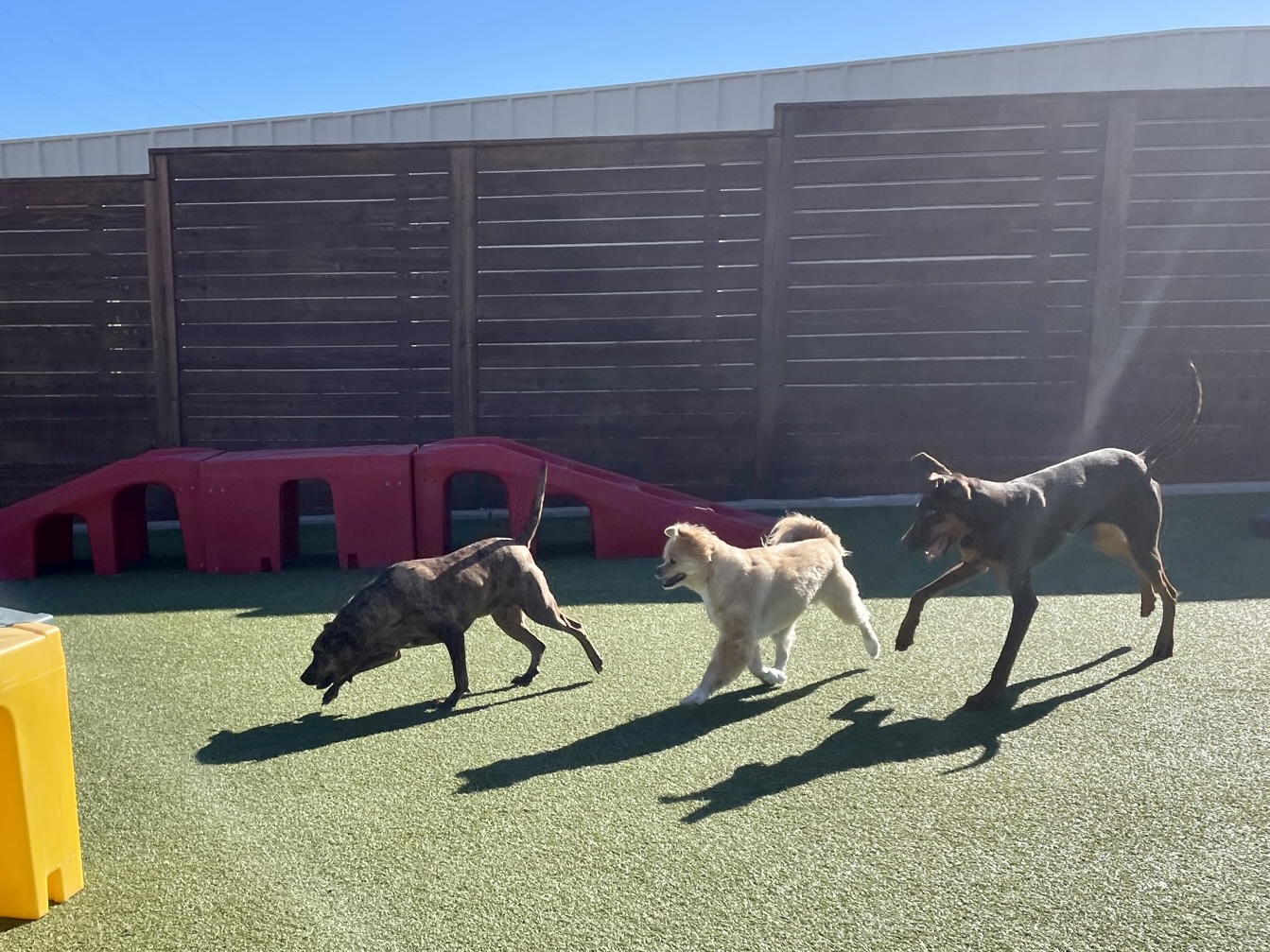
Frequently Asked Questions
Dog daycare plays a significant role in enhancing your pet’s social skills and overall well-being. Here are some commonly asked questions to help you understand its benefits better.
1. How can daycare help with my dog’s separation anxiety?
Daycare keeps your dog busy through the day while providing social interactions. This reduces feelings of loneliness and can greatly help with separation anxiety. Being around other dogs and caregivers distracts them from missing you. Over time, this environment can change how they cope when you’re not around.
In addition to socialization, the structured routine at daycare offers mental and physical stimulation. This helps tire your dog out, making them more relaxed when they are back home. Consistent exposure to such activities can lessen anxiety triggers. It reassures them that they are in a safe and enriching environment.
2. What kind of activities do dogs engage in at daycare?
At daycare, dogs take part in various activities designed to stimulate both their minds and bodies. These activities can include group play, agility courses, and interactive toys. Social playtime with other dogs helps improve their social skills. Structured games, under the supervision of trained caregivers, ensure safety and enrichment.
Moreover, activities are customized to suit different breeds and energy levels. Some daycares also offer training sessions and puzzle games for mental stimulation. Engaging in such diverse activities helps reduce boredom. This promotes better overall behavior and mental health for your dog.
3. Is dog daycare suitable for all dog breeds?
Most dog daycares are designed to accommodate a wide range of breeds. They can tailor activities and care based on each dog’s size, age, and temperament. Before enrolling, a temperament test is often conducted. This ensures that your dog can adapt well to the daycare environment.
However, it’s crucial to communicate any special needs or concerns with the staff. Some breeds may require specific care or less strenuous activities. The goal is to provide a comfortable and enriching experience for every dog. Daycare staff are trained to cater to these individual needs effectively.
4. How can I know if my dog is enjoying daycare?
Paying attention to your dog’s behavior can reveal if they enjoy daycare. If your dog seems excited upon arriving, it’s a positive sign. Dogs that are happy and eager to join playgroups usually are content. Also, notice any changes in behavior at home.
A relaxed and well-behaved dog after daycare suggests they were positively engaged. Additionally, most daycares provide regular updates or report cards about your dog’s day. This feedback is invaluable in understanding how well they are adjusting. Communicating with the staff can also give further insights.
5. What should I look for in a good dog daycare?
A top-quality dog daycare should have clean and safe facilities. The play areas should be secure, spacious, and well-maintained. It is also essential to check the staff’s qualifications and experience. Trained professionals ensure your dog receives the best care possible.
Good daycares maintain high standards of hygiene and safety protocols. They should have clear policies for health, emergency situations, and vaccinations. Observing how the staff interacts with the dogs can offer insights into their commitment. Choosing the right daycare ensures a positive experience for your dog.
Conclusion
Dog daycare offers numerous benefits, from improving social skills to enhancing physical health. It provides a structured environment, allowing dogs to thrive through routine and supervision. Positive behaviors are encouraged, resulting in happier and more balanced pets. Moreover, the expertise of trained professionals ensures a safe and enriching experience.
Choosing the right daycare requires considering the facility’s cleanliness, staff qualifications, and activities offered. With careful selection, you can find a daycare that meets your dog’s needs. Investing in your pet’s socialization and well-being pays off in long-term health and happiness. Both you and your dog can enjoy the peace of mind that comes with quality care.
"*" indicates required fields
